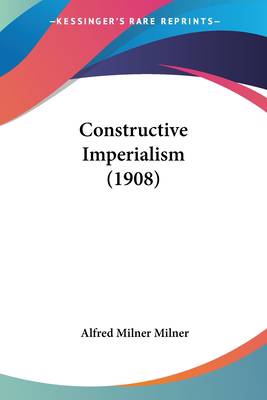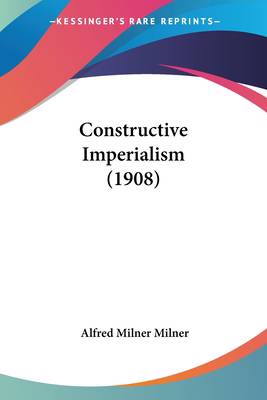
- Afhalen na 1 uur in een winkel met voorraad
- Gratis thuislevering in België vanaf € 30
- Ruim aanbod met 7 miljoen producten
- Afhalen na 1 uur in een winkel met voorraad
- Gratis thuislevering in België vanaf € 30
- Ruim aanbod met 7 miljoen producten
Zoeken
Omschrijving
Constructive Imperialism is a book written by Alfred Milner in 1908. Milner was a British statesman and colonial administrator who served as the High Commissioner for South Africa from 1897 to 1905. In this book, Milner argues that imperialism should not only be seen as a means of acquiring territory and resources, but also as a way of promoting social and economic development in the colonies.Milner believes that imperialism can be a force for good if it is done in a constructive way. He argues that the British Empire has a responsibility to help the people in its colonies by providing them with education, healthcare, and infrastructure. He also believes that the British Empire should promote democracy and self-government in its colonies, rather than ruling them with an iron fist.Milner's ideas were controversial at the time, as many people saw imperialism as a way of exploiting and oppressing people in the colonies. However, his ideas were influential in shaping British colonial policy in the early 20th century. This book is an important historical document that sheds light on the debates surrounding imperialism and colonialism in the early 20th century.This scarce antiquarian book is a facsimile reprint of the old original and may contain some imperfections such as library marks and notations. Because we believe this work is culturally important, we have made it available as part of our commitment for protecting, preserving, and promoting the world's literature in affordable, high quality, modern editions, that are true to their original work.
Specificaties
Betrokkenen
- Auteur(s):
- Uitgeverij:
Inhoud
- Aantal bladzijden:
- 106
- Taal:
- Engels
Eigenschappen
- Productcode (EAN):
- 9781120273253
- Verschijningsdatum:
- 15/10/2009
- Uitvoering:
- Paperback
- Formaat:
- Trade paperback (VS)
- Afmetingen:
- 152 mm x 229 mm
- Gewicht:
- 154 g

Alleen bij Standaard Boekhandel
+ 59 punten op je klantenkaart van Standaard Boekhandel
Beoordelingen
We publiceren alleen reviews die voldoen aan de voorwaarden voor reviews. Bekijk onze voorwaarden voor reviews.











